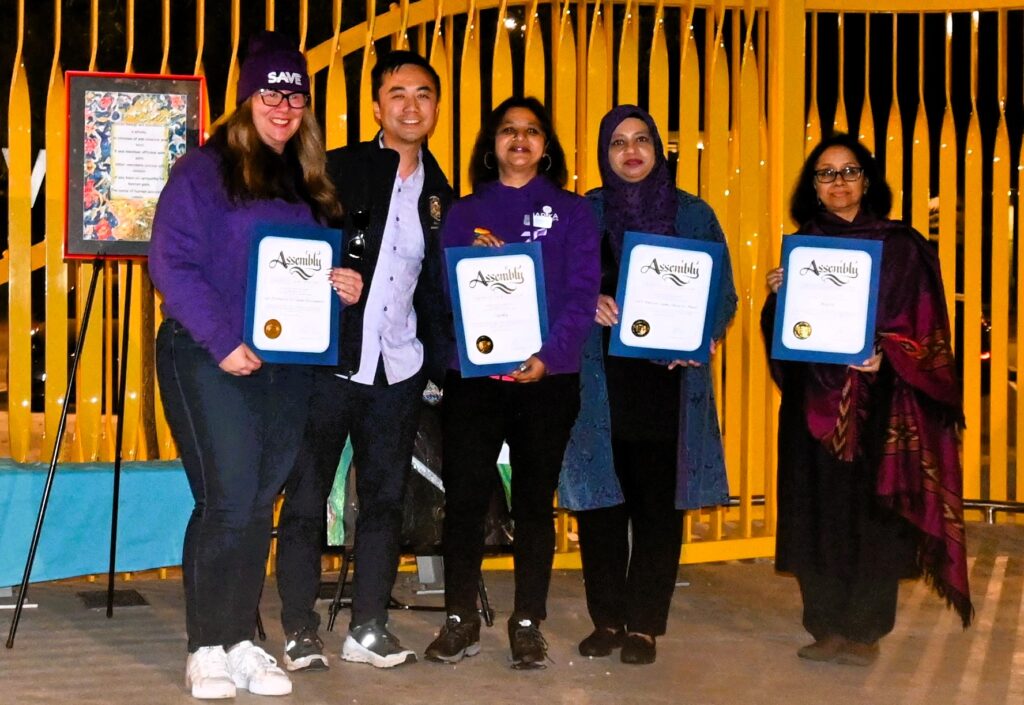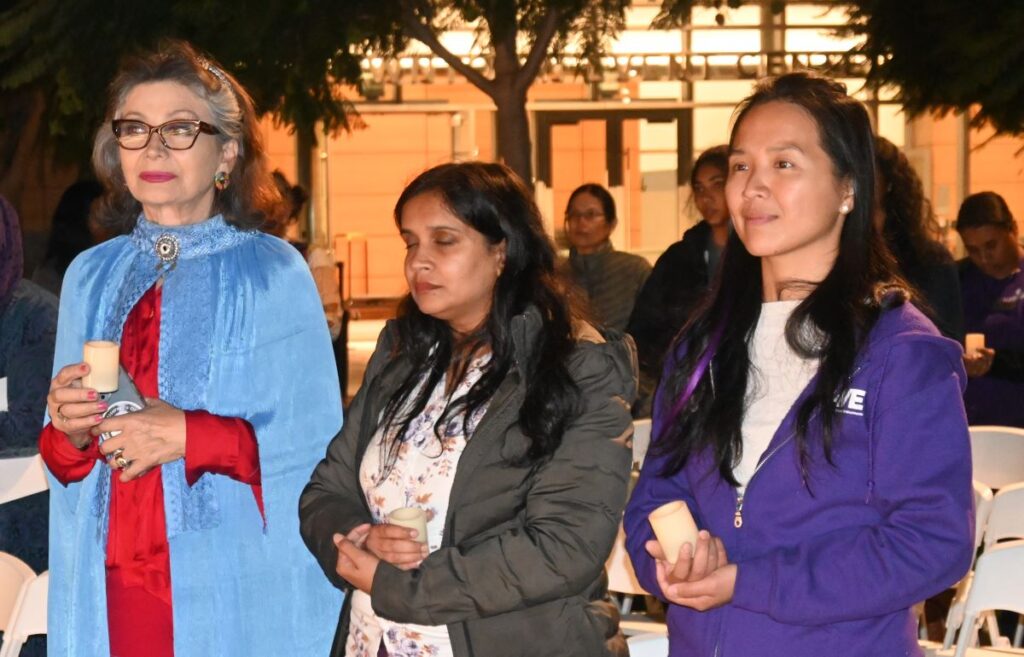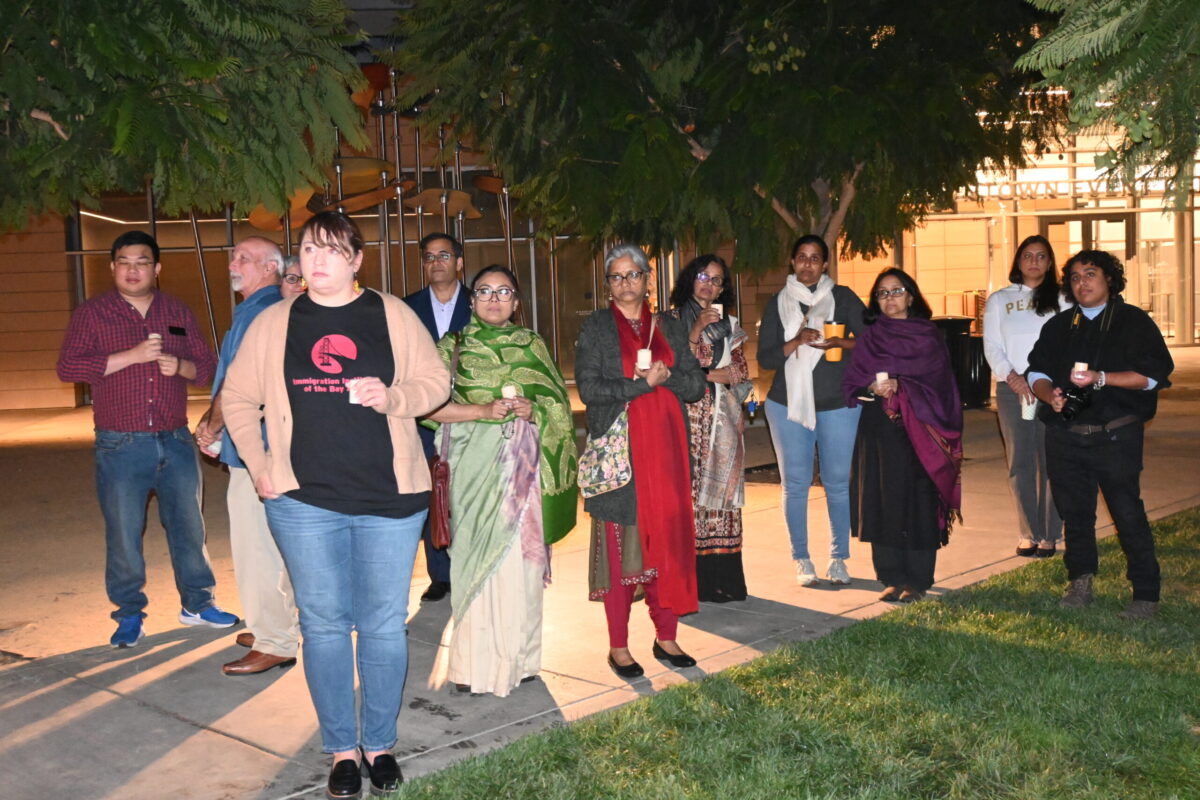FREMONT, California — Purple-clad women from four Bay Area-based organizations gathered together here Oct. 23 evening to draw attention to domestic violence.
The vigil, which is an annual event, was jointly organized by Maitri, Narika, Safe Alternatives to Violent Environments — SAVE — and the North American Islamic Shelter for the Abused.
Several survivors, including political leaders, spoke about the difficulty of leaving abusive relationships and the lack of resources available to those who needed to flee.
One in 3 women have faced intimate partner abuse in their lifetime.
Safety Nets
Last year, in California, 103 lives were lost to domestic violence, noted Rama Dharmarajan, executive director of Maitri. She believes that number represents massive under-reporting of deaths from intimate partner violence.
California state Assemblymember Alex Lee, a Democrat who represents Fremont and portions of the South Bay in the State Legislature, spoke about the need to create safety nets for women and children escaping abusive situations.

But funding for organizations who support victims of violent crime drastically dropped this year by 44.7%, leaving many organizations to cut staff and services. Currently, support for crime survivor services comes primarily from a federal fund known as the Victims Of Crime Act.
Funding Drop
VOCA funds are gleaned from fines and penalties resulting from convictions in federal cases. But as the landscape of criminal cases undergoes massive reformation, VOCA funds have steadily dropped.
In 2023, California received $153 million in VOCA funding. For 2024, funds dropped to just $87 million.
More than 800,000 people in California are supported by VOCA dollars, including survivors of domestic violence, rape, human trafficking, elder abuse, and child abuse. Funds support rape crisis centers, transitional housing, domestic violence shelters, legal help, counseling and therapy, among other services.
Homelessness
VOCA funds make up 100% of the state’s grants for organizations to provide domestic violence housing, transitional housing, child advocacy, victim and witness assistance, and support for unserved/underserved survivors. Domestic violence organizations this April had asked for a $200 million flush of cash to offset the drop in funds from VOCA. But that request was not granted, amid the state’s $40 billion deficit.
Women fleeing abusive homes often end up homeless. A study released last year by the UCSF Benioff Housing and Homeless Initiative found that 40% of participants reporting IPV in the six months before homelessness said violence was one reason for leaving their last housing. 20% said it was the primary reason.
Incarceration
Incarceration is often also an outcome for women who have been abused. 74% of women in prison report they had encountered intimate partner violence, said community leader Fahria Khan at the Fremont vigil. “These women have suffered years of physical and emotional abuse. They woefully lack legal resources and support. And we treat them like criminals.”
Evidence of intimate partner violence is rarely allowed in court, noted Khan. Her remarks were borne out by a 2017 case in the Silicon Valley. Neha Rastogi had endured a decade of physical abuse from her husband Abhishek Gattani, a serial entrepreneur. Rastogi began to secretly tape Gattani’s abuse, but she was not allowed to present it in court. Gattani served only 13 days in jail.
Breaking the Cycle
Fremont Vice Mayor Desrie Campbell noted that she had experienced domestic violence. “We didn’t have restraining orders back then. We didn’t have shelters,” she said, lauding the fact that laws protecting survivors of violence are on the rise.
Fremont City Councilwoman Teresa Keng shared that she too came from a family of domestic violence survivors, which impacted both her mother and grandmother. “It is very hard to break the cycle of abuse. You grow up thinking ‘this is the norm,’” she said.
Women in Afghanistan

In one of the most wrenching moments of the evening, Nahid Aria, an artist from Afghanistan, spoke of the violence women and girls are facing in her home country. “Girls cannot go to school; women cannot work. We have to cover up in a burqa, like birds in a cage.”
“We burn ourselves when we experience abuse. Because there is no law to protect us,” said Aria. “We are blamed when we are harmed or raped. We are told we brought in on ourselves.”
Aria read a verse by the Persion poet Saadi Shirazi.
Human beings are members of a whole
In creation of one essence and soul.
If one member is afflicted with pain
Other members uneasy will remain.
If you have no sympathy for human pain
The name of human you cannot retain.
Other survivors then read the verse in Mandarin, Spanish, and Hindi.




